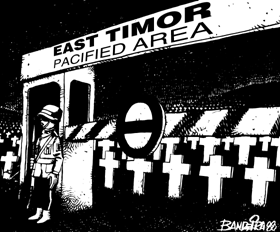
| ||
 | ||
 |
Witnessing the terror in East Timor
|
SYLVAIN COMEAU | El Obaid Ahmed El Obaid, a senior fellow at the Institute of Comparative Law, left East Timor on September 2, hours before all hell broke loose.
El Obaid was there as an international observer, representing the Asian Network of Free Elections, keeping a close watch as the East Timorese voted to end Indonesian rule in their nation. He gave his eyewitness account in a lecture in the Faculty of Law's Moot Court last Wednesday. The Asian Network delegation arrived in Dili, a city that is the site of East Timor's United Nations compound, on August 26. El Obaid says the power of the pro-Indonesia militia, which has been accused of murdering hundreds, perhaps thousands, of East Timorese after the vote, was evident almost immediately. "We went to the downtown area of Dili to get provisions, only to realize that the centre of town -- where most of the government facilities, hotels and shops are located -- was being run more or less completely by the militias." El Obaid said his group got a small taste of the abuse inflicted on East Timor residents. "We were stopped three times at gunpoint, and roughed up. And bear in mind that our group, as foreigners, had a much better chance to escape the worst of the abuse. What the local population suffered was a million times worse." El Obaid says that the international community allowed the terror and mass murder to happen by leaving the wrong people in charge. "The international community entrusted security (during the referendum period) to Indonesia. A lot of people, myself included, believe that that was a mistake. But the same security forces assigned to maintain peace and security were the same ones which have been responsible for many human rights violations in East Timor's history." On the second and third day of their trip, the Network delegation witnessed the worsening results of that mistake. "We visited a pro-independence town, Memo, which we heard had been attacked by pro-integration forces. As we approached it on August 28, we could see smoke rising from the town. Houses were burned down, and four people had been killed, as the town was ransacked and burned." The group encountered several roadblocks as they moved through East Timor, "run mostly by young men, 15 to 20 years old, armed with homemade guns and bows and arrows. It was often dangerous, again, not so much for us as foreigners but for our drivers, interpreters and assistants. "As foreigners, we could always be kicked out, but we felt at best only a kind of second or third hand fear. It was hard to imagine how many people locals have lost so far, and how many times they were sent to detention and torture centres." El Obaid mentioned a scary case in point. "One of the people accompanying us as a translator showed us both his thumbs, which were crooked and damaged. He said: 'This is my first prison visit; this is my second.' So you can get an idea of the level of intimidation and violence that preceded the vote." When the referendum on independence finally came, on August 30, 78.5 per cent of voters chose independence. El Obaid noted that the figure would have been even higher were it not for intimidation at some polling stations. "One figure which people often ignore is the 98.6 per cent voter turnout. When was the last time we've seen that happen? Perhaps never. In a real sense, this was a remarkable human achievement." The group witnessed people's determination to risk everything, even in the face of terror and threats to their lives. El Obaid came to admire that courage. "On the morning of the vote, by 4:30 a.m. most of the polling stations we passed were packed with people waiting to vote -- this in the midst of a long-term campaign of intimidation and violence. "When these people's backs were to the wall, they made a choice, knowing that the choice they made was quite costly. It is not far-fetched to say that their choice implied the risk of death, but they made it with the expectation of a better life in the future." El Obaid's presentation was co-sponsored by the Faculty of Law and InterAmicus.
|
|
| |||||